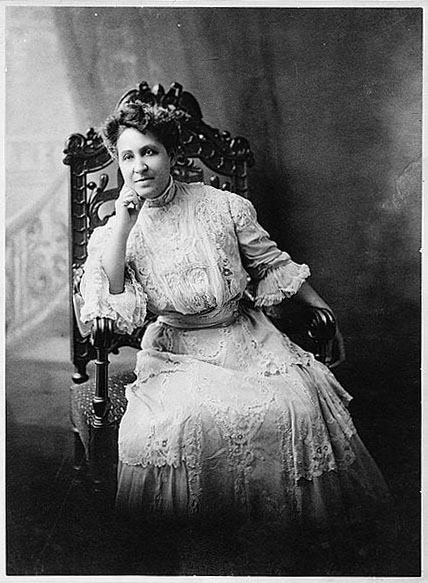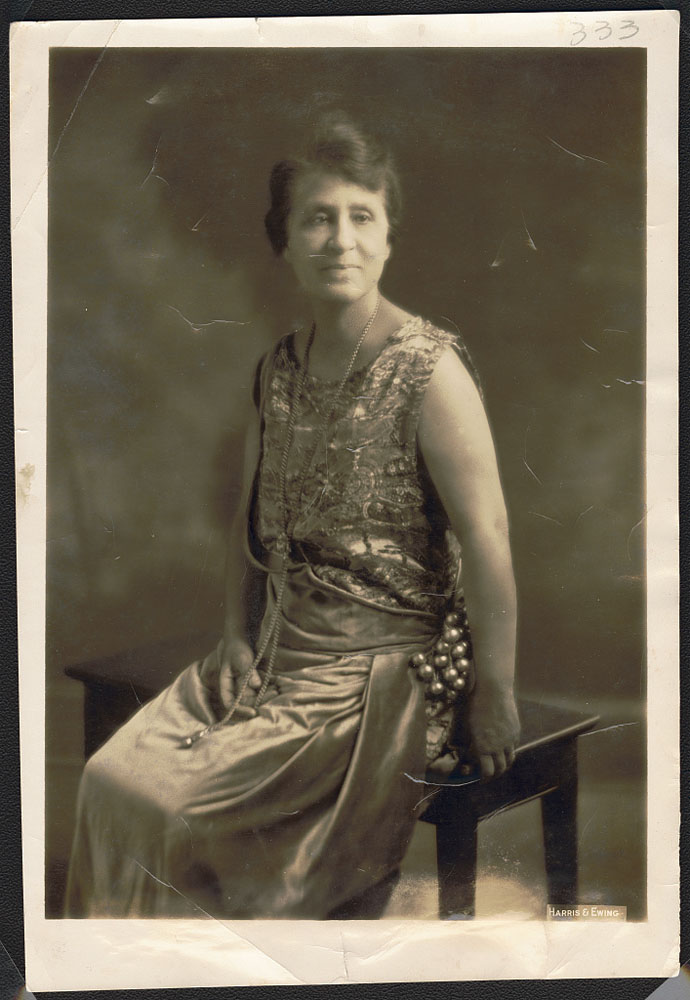September 23, 1863
Celebrate the 100th anniversary of the 19th Amendment with stories about the people and events that led to the passage of women’s suffrage in the United States.
On September 23, 1863, renowned civil rights activist Mary Church Terrell was born in Memphis, Tennessee. A tireless champion of women’s rights and racial justice, Terrell was especially active in the Washington, D.C. area, where she lived for much of her life.
Mary Church Terrell, photo taken between 1880 and 1900, printed later. Library of Congress Prints and Photographs Division.
Mary Church Terrell was born to two former slaves turned successful entrepreneurs. Her father, Robert Church, was known as the South’s first black millionaire.
Her privileged upbringing placed Terrell among the rising black middle and upper classes who used their position to fight racial discrimination. She was one of the first black women to earn a college degree, and her studies at Oberlin College exposed her to the growing suffrage movement in the United States.
In the wake of Plessy v. Ferguson, the 1896 Supreme Court decision that upheld the constitutionality of racial segregation under the “separate but equal” doctrine, black women from across the country gathered at a three-day convention in Washington, D.C. This convention resulted in the birth of the National Association of Colored Women, which consolidated several advocacy groups into one. Terrell was elected the first president of the group at the end of the convention, serving until 1901 and coining the group’s motto, “Lifting as we climb.” As president, she toured the country giving lectures, and wrote various essays that were published in papers across the nation including “Lynching from a Negro’s Point of View,” which ran in the North American Review in 1904. An accomplished educator, Terrell made history as the first black woman on the D.C. Board of Education from 1895-1911.
Terrell was an active member of the National American Woman Suffrage Association (NAWSA), through which she developed a lifelong association with Susan B. Anthony. At the 1898 NAWSA convention, Terrell specifically appealed to the organization to fight for the enfranchisement of black women. Between 1904 and the ratification of the 19th amendment in 1920, she was active in the suffrage cause as a lecturer, writer and organizer in Washington, D.C. and across the nation. In 1904, she was the first black woman to attend the International Congress of Women in Berlin, where she delivered her speech in German, French, and English. She was a founding member of the NAACP, signing onto its charter in 1909.
In 1913, the day before Woodrow Wilson’s inauguration, Terrell led the Delta Sigma Theta sorority of Howard University in a strike organized by NAWSA in support of women’s suffrage. Two presidential terms later, she was involved in the Republican Party’s organizational efforts, campaigning for Warren G. Harding in 1919. Harding won the 1920 election, the first in which (predominantly white) women could vote. While the fight for women’s suffrage was settled, many black women, particularly in the South, remained disenfranchised. It would be decades before the Voting Rights Act overturned discriminatory voter registration laws. Knowing the fight was not over, Terrell remained a dedicated activist for the rest of her life.
Mary Church Terrell, three-quarter length portrait, seated, facing front. Harris & Ewing, photographer, taken between 1920 and 1940. Library of Congress Prints and Photographs Division.
In 1950, long after the fight for suffrage had been won, Terrell again gained visibility as an activist, this time in the fight for racial justice. That January, 86-year-old Terrell entered Thompson’s Restaurant in Washington, D.C., which was still segregated. The restaurant refused to serve Terrell and her companions. This set off a 3-year court battle, ultimately resulting in a unanimous ruling in District of Columbia v. John R. Thompson Co., Inc., which formally desegregated Washington, D.C., restaurants.
Learn more about Mary Church Terrell in “Just Another Southern Town: Mary Church Terrell and the Struggle for Racial Justice in the Nation's Capital” by Joan Quigley, available at the Library.
2020 marked the centennial of women’s suffrage in the United States.


WOW … thank you for sharing this information. What an incredible human! I wish there was a button so that I could share it.
To fight for the enfranchisement of African American Women, was indeed historic and necessary. Her life and history, shows that we have come a long way to being a better nation for all citizens.
Interesting local lady. It will be cool to read about more figures like this. I upvote the share button idea, too.